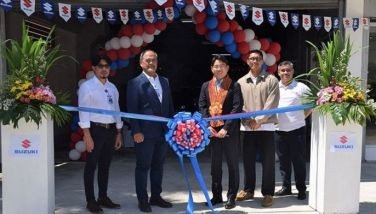Action vs. Reaction
You might have noticed that we’ve gone on a bit of a soul-searching phase here at the Business Motoring section of The Philippine STAR. There’s a reason for this, of course. Is this the closest thing we’ve come to a Jerry Maguire moment? Perhaps. All we know is that we’re quite obsessed with responsible motoring at the moment, if only because we feel the need to contribute to an improved Philippine society – with this talk of positive change surrounding us all now.
Last week, we featured – prominently – our collective efforts to go the green route in order to save this planet we call home. We did promise that we’d come up with a series of follow-up stories on environmental awareness in the motoring sense – and we will. But a certain issue none of us can overlook called road safety just hit us all right smack in the head again last week. And so we digress. Immediately after the tragic Cebu bus crash last week, we got in touch with our Cebu correspondent Bibot Avila, an avid motorist himself and quite the knowledgeable fellow in events and happenings down south. We asked him to investigate a bit and to write a story on how the tragedy could have been avoided. Hence, the story on page C-4 of this section.
We do have our own opinions on the matter and are very much in agreement with Mr. Avila on several of the arguments presented regarding how all this could have been avoided. True. The concerned government agencies reacted swiftly, suspending operations here, canceling licenses there. But, as our title might already suggest, therein lies our true failure. It really does take a certain amount of shock before positive action occurs in these shores. Often, we react more than we act.
Our ups and downs are mostly dictated by occurrences around us. Rarely do we anticipate – and therefore get to prevent – tragedies and crucial decisions. If there were rules preventing the travel of buses the size of that which met the tragedy in the particular highway, for example… How were they circumvented? While it’s perfectly understandable that the concerned government agencies reacted swiftly, could it have been possible, really, to have altogether avoided the tragedy with firmer pro-active action?
We don’t even have to go all the way down south to ask such questions. Another hot topic in the motoring world these days does not even concern cars per se – or tragedies that claim lives, for that matter. With the South Luzon Expressway’s construction in the final phase of completion (well, at least a very specific portion of it), transport groups are up in arms about just how much the toll fees are set to increase by the end of the month. As of presstime, the issue is already being taken to court.
But let’s hold our horses, shall we? Didn’t we see this particular movie before? Not too long ago, wasn’t the northern part of Luzon – and its infrastructure development – given the eye-of-the-needle treatment as well? You’d think we’d have learned our lessons from that particular brouhaha. Like what is happening south of Metro Manila now, a world-class highway was constructed as we continued to use it. Like what is happening south of Metro Manila now, the fees for use of the said highway naturally spiraled upwards. So the question now is, why did we all wait for this particular highway’s completion before we decided to raise hell? We knew prices were going to rise from previous experience. We knew they were going to be substantial increases. Why didn’t people act pro-actively instead of react belatedly? We could have been having staggered price increase debates while construction was just underway, right? It’s ridiculous in its soap opera level repetitiveness.
Here’s fact, however. The worst has hit us already. And it’s hit us hard – where it really hurts. Lives have been lost and pockets are set to be emptied. With the natural reaction of fault-finding hitting a brick wall in the case of the Cebu accident (the driver/bus company owner perished along with the other victims), we’re left with no other recourse but to rectify the situation to the point where it becomes close to impossible for it to happen again.
Rules and regulations must be set and standards of safety must be set and subsequently met – by the vehicles themselves, by the transport companies whose role is to transport people safely, by the government agencies involved and their implementing arms, by the local governments as well. Personally, I think it’s time we looked past what’s already happened and think about how we can prevent it all from happening in the future. And we have to do this now, as in this absolute present.
Reacting in time is an oxymoron. Because when you react, that means you’ve already failed to anticipate the worst – and are already resorting to action plans that can only help ease the situation. Acting ahead of time, now that’s something we can actually do well to practice. How about we think, for once, that we can actually do it? And then give it one solid push…
Here’s a Backseat Driver reaction to Andy Leuterio’s Future Features…
Call me backwards but I really wish they won’t get rid of the stick shift and clutch pedal. I’ve driven manual, automatic and manu-matic cars but nothing still beats having the actual stick shift and clutch pedal. It gives you total car control and performance where the car will run depending on how skilled you are. I hope they can keep in mind the real drivers out there that would still want to keep that feature without paying an arm and a leg. – Eedward
And one to our lead story by James Deakin featuring the test drive on the new Nissan X-Trail CVT…
I actually like what Nissan is doing, the (old) Sentra and X-Trail have been around for so long and even if a platform update has been done, the body is almost the same. I normally get upset when a car company changes models so often. I would, however, appreciate some interior and safety features upgrade since the Sentra can no longer compete with the Vios. The only thing I hate with Nissan is that they release their models late. I would understand a 6-month to 1 year delay late but it really took some time before the Sentra 200 arrived in our showrooms. – ice15
- Latest
































